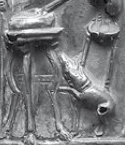In Explanation of “Anticipations”: An Interesting Analogy From Norman DeWitt, And A Suggestion From Seneca
 I now tend to think that the best in-depth explanation and defense of “Anticipations,” under the name of “Innate Principles,” has been given to us by Jackson Barwis in his Dialogues Concerning Innate Principles. However, as I was rereading Norman DeWitt’s St. Paul and Epicurus this weekend, I came across a paragraph which offers an analogy that I do not recall in Barwis, but which also seems very helpful. DeWitt wrote that Epicurus “thought of the mentality of the grown man as being anticipated in the newborn infant just as the whole physical body is anticipated in the embryo before birth.”
I now tend to think that the best in-depth explanation and defense of “Anticipations,” under the name of “Innate Principles,” has been given to us by Jackson Barwis in his Dialogues Concerning Innate Principles. However, as I was rereading Norman DeWitt’s St. Paul and Epicurus this weekend, I came across a paragraph which offers an analogy that I do not recall in Barwis, but which also seems very helpful. DeWitt wrote that Epicurus “thought of the mentality of the grown man as being anticipated in the newborn infant just as the whole physical body is anticipated in the embryo before birth.”
This seems to me to be an excellent way to illustrate the concept. Here’s the full quote from Chapter 1 of St. Paul and Epicurus:
What is meant by an Anticipation or, as Epicurus calls it, a Prolepsis, is not difficult to explain, though generally misunderstood. Epicurus believed that man is preconditioned by Nature for living in his physical and social environment. On the physical level he is equipped in advance by Sensations and Feelings. On the level of social and intellectual life he is equipped with innate ideas, such as that of justice, which exist in advance of experience and so anticipate experience, being for that reason called Anticipations. He thought of the mentality of the grown man as being anticipated in the newborn infant just as the whole physical body is anticipated in the embryo before birth. He even insisted that man is born with an innate notion of the divine nature, but only as “blissful and incorruptible,” not wrathful. In spite of this fact his usual reputation was that of an atheist.
Here’s another illustration, this in the form of an example in the letters of Seneca, (Seneca’s Letters – Book I – Letter IX). Although Seneca does not use the word “Anticipation,” note how he is discussing Epicurus and finds it natural to categorize a principle as “universal, suggested of course by Nature.” Although with Seneca we always need to take care to distinguish when he is referring to Epicurus and when to the Stoics, here the reference to Nature, rather than the gods, makes the meaning clear:
You desire to know whether Epicurus is right when, in one of his letters, he rebukes those who hold that the wise man is self-sufficient and for that reason does not stand in need of friendships. This is the objection raised by Epicurus against Stilbo and those who believe that the Supreme Good is a soul which is insensible to feeling.
…
But you must not think that our school alone can utter noble words; Epicurus himself, the reviler of Stilbo, spoke similar language; put it down to my credit, though I have already wiped out my debt for the present day. He says: “Whoever does not regard what he has as most ample wealth, is unhappy, though he be master of the whole world.” Or, if the following seems to you a more suitable phrase – for we must try to render the meaning and not the mere words: “A man may rule the world and still be unhappy, if he does not feel that he is supremely happy.” In order, however, that you may know that these sentiments are universal, suggested, of course, by Nature, you will find in one of the comic poets this verse – “Unblest is he who thinks himself unblest.”
More than ever I think Barwis framed the significance of Anticipations properly in his Dialogue:
Do you, then, interrogated I, maintain the reality of innate principles? I do, answered he in a firm tone; and I hope, for the sake of sound morals and of truth, important objects with you, to convince you of that reality.
For the sake of sound morals and of truth, we must come to realize that “Anticipations” are not “just” the third leg of the triad that constitutes the Canon of Truth. Anticipations are an essential input for evidence from which we must calculate the way to live our lives according to Nature. This source of evidence is no less important to us than our sense of sight or our feeling of pain and pleasure, and we ignore it with at least as much peril as if we ignore what we see or what we feel. It might not be too much of an exaggeration to say that our ignorance of this third leg is near the root of many of the worst troubles that plague us as individuals in the modern world.

